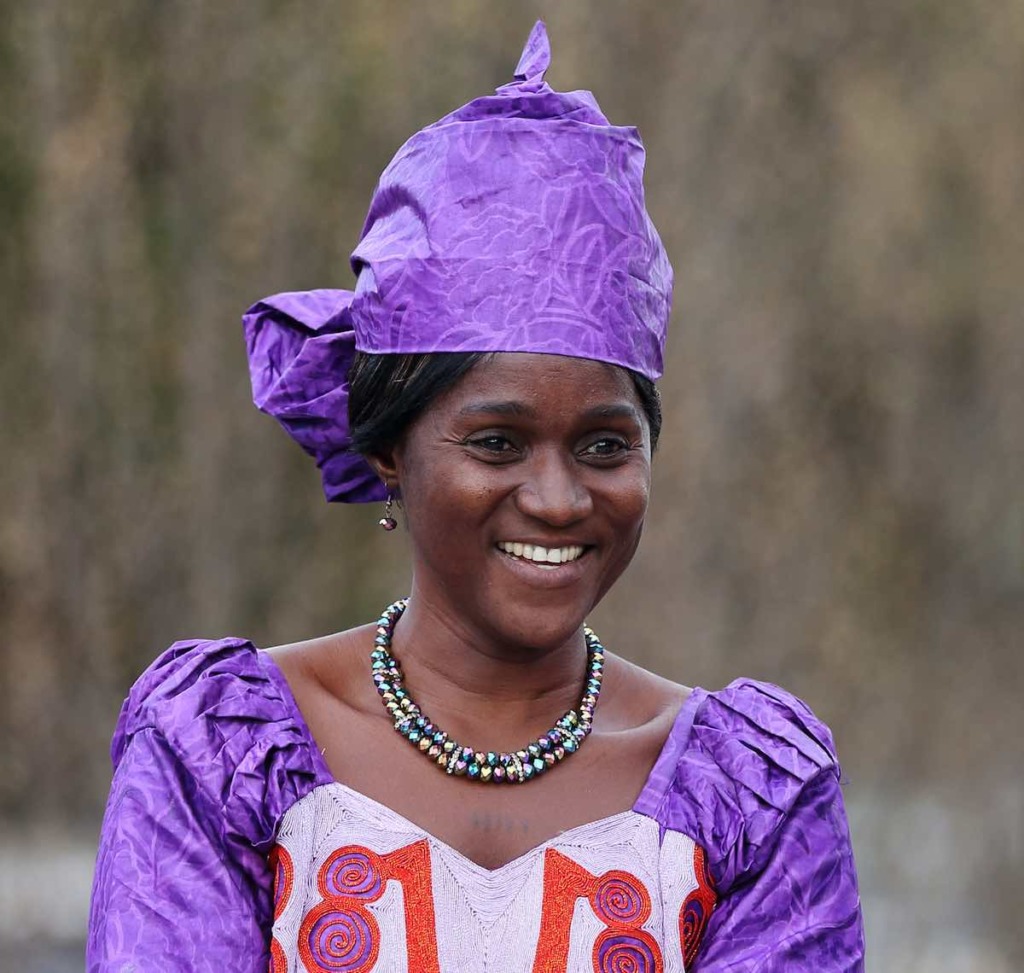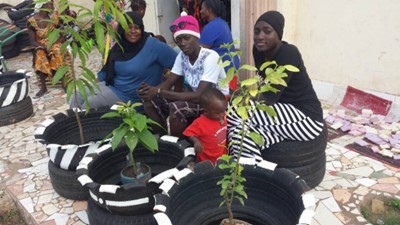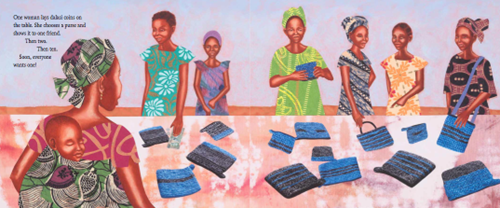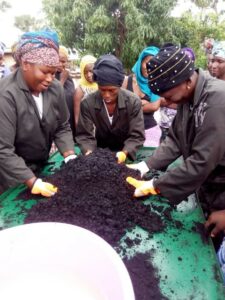
Isatou Ceseey (One Plastic One Bag)
“WHEN PLASTIC WASTE BECOME A BAG…“
Waste… What is it? When waste is little it does not create problems, but at a certain point it manifests its negativities. When Isatou Ceseey (better known as the Queen of Plastic Recycling in Gambia), walking around her neighborhood, found columns of plastic piling up behind the houses she thought it was important to solve this torture for the environment and human eyes by educating women to the importance of recycling waste. That brought to the creation of the Recycling Centre of N’Jau. Every week, members of Women Initiative The Gambia (WIG) now craft wallets, bags, and balls for children from the reclaimed plastic bags that they cut, knit and sew patiently. «But in the beginning, women wouldn’t believe we could turn plastic into revenues », remembers Isatou.
The project One Plastic One Bag goes far beyond reducing the impact of plastic on the environment. It is about educating communities in order to make them sustainable and resilient. It is a social development and ecologically sustainable project.
Circular economy, local economy and first of all shifting from short-term to long-term thinking is the way to create a real sustainable society. Thank you Isatou for giving this important example to humanity, and for answering to our questions
.


For further details –
http://oneplasticbag.com/
http://womeninitiativegambia.org/
INTERVIEW – (July 2019)
This interview was made and published in July 2019 on www.lteconomy.org
Subject: Plastic Recyclinge
By Dario Ruggiero, Founder of Long Term Economy
Highlights
- I should need a single sheet to talk about motivations but a book to write down all the problems plastic pollution brings with it.
- After this experience if you ask me what kind of characteristics have these women, I will say, They are: i) Committed; ii) Creative; iii) Active; iii) Responsible and focused.
- Obstacles… there are many… Plastic pollution is mainly a consequence of obsession for growth in a globalised words where material goods are transported in plastic packaging.
- For youth… Make a relevant project, one that involves your community, and that includes knowledge and funding. Be a great mentor.
“I should need a single sheet to talk about motivations,
but an entire book to write down all the problems plastic pollution brings with it”
⇓
Question 1 | The issue of plastic waste
Dear friends from Long Term Economy, of course when you observe a degradation phenomenon affecting your country you have three choices: 1) It’s no matter of mine; 2) I will emigrate; 3) My will is to solve it. Well, let’s talk about the third option… When your will is able to influence and merge with the will of others it can realise your goal! I should need a single sheet to talk about motivations but an entire book to write down all the problems plastic pollution brings with it… Essentially…Motivations:
i) Lot of plastic waste around my community;
ii) Give information to my community about the climate risks related plastic waste;
iii) Overcoming challenges faced by women with new ideas.
Why is plastic waste important?
i) It causes land degradation.
ii) It causes loss of livestock, especially, domestic animals.
iii) It blocks drains and causes flooding, creating an idle breeding ground for mosquitos that spread malaria.
iv) It can cause spontaneous fire, causing loss of valuable and lives.
v) It can be blown into the sea by the wind and harm marine life which can also be transferred to humans after eating the sea food.
vi) It’s also a public health issue.
Making plastic waste useful…

⇓
Question 2 | The project “One Plastic One Bag”
Let’s talk more in detail about your project “One Plastic One Bag”. What does it consist of? What are its main initiatives?
One Plastic One Bag is not just a recycling process… It is a social development project. When a project includes Environment, Economy and Education, it means a social change. In practice, “one plastic one bag is a training module on its own”(Educational project); “it is a confidence building project for the young ones (Social project),” it generates an “attitudinal change towards littering of plastic waste (Educational change), and finally “it reactivates local economy by reusing zero-cost material (economical change).”
Making bags from plastic

“After this experience if you ask me what kind of characteristics
do these women have, I will say, they are:
i) committed; ii) creative; iii) active; iii) responsible and focused”
.
⇓
Question 3 | The importance of women in the project
Of course, when you find a problem and you want to solve it, at the beginning you think you are alone. Sometimes you say, ok I am alone… I will never manage it… Other times you say, I want to solve it… I want to solve it…. And then? What happens? You find or you attire other people who think the same way… Destine has wanted that I found in many women here in Gambia the right characteristics to bring forwards the scope of cleaning our community from plastic. After this experience if you ask me what kind of characteristics have these women, I will say, They are: i) committed; ii) creative; iii) active; iii) responsible and focused.
Question 4 | Itegration benefits
Well, very good question Mr. Dario! Perhaps we can talk about the beneficial effects in environmental terms. But it’s not just about that. You need to create skills and culture. The One Plastic One Bag project i) builds leadership skills and self-confidence among young and women. ii) It brings entrepreneurships and income generation skills and iii) above all women recognition within the communities.
Has it integrated different ethnic groups?
That’s a very important point. Integration and inclusion are the main characteristics of this project. All the women groups we work with are a mix of different ethnic groups

“The reality is that profound economic innovation
is often based on ecosystem awareness, i.e., the ability
to sense the needs and aspirations of the stakeholders you are dealing with”
⇓
Question 5 | Replacing plastic
Of course recycling plastic to make a new products that we are selling locally and all over the world has been a good starting point. Sustainability also depends on how we activate cycles of economies built on greener materials. We have different alternatives like, luffas sponges for washing dishes instead of the plastic ones. We also use calabash to replace plastic spoons and bowls. So yes… your limits are in your mind.
“Obstacles… there are many…
Plastic pollution is mainly a consequence of obsession for growth
in a globalised words where material goods are transported in plastic packaging”
⇓
Question 6 | The plastic matter in the world
It’s not simple to answer. Obstacles… there are many… Plastic pollution is mainly a consequence of obsession for growth in a globalised words where material goods are transported in plastic packaging. In other words: The major obstacles are developed and developing nations which produce plastic and export it to under-developed countries.
“Make a relevant project, one that involves your community,
and that includes knowledge and funding. Be a great mentor”
⇓
Question 7 | The leader in 21st century
You come from a country, Gambia, with a lot of obstacles to positive projects, but you are pursuing your goals. You are a leader. What’s your definition of a leader in 21st century? What’s your advice for the young who want to realise their own projects?
Becoming a leader in this time of uncertainty is more difficult than in the past. My definition of a leader in this generation is someone who believes in him or herself, someone who is creative, flexible, but at the same time someone who is focused and honest. One thing surely a leader in the 21st century should not lack is good networking and communication abilities.
What about the young?
The suggestion I have for the young ones with great ideas are: “Make a relevant project, one that involves your community, and that includes knowledge and funding. Be a great mentor!”
⇓
Question 8 | The role Gambia and the other African Countries in today’s global challenges
Let’s finally expose your opinion on the role Gambia and the other African Countries can have in facing current global issues (e.g., climate change, ecological crisis and social instability). In particular, what’s your opinion and aspirations for the future of Gambia?
i) Stay with recycling and proper waste management;
ii) Nutrition projects;
iii) Reforestation;
iv) Youth and women empowerment.